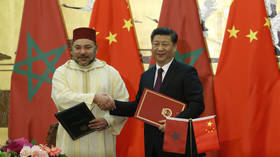America is in danger of having more rivals than it can handle
Tom Fowdy

As the Ukraine crisis rolls on, there is a growing fear among Western commentators and foreign policy elites that a “China-Russia” axis is consolidating, which will pose a gargantuan threat. With this thinking, many, especially on the right of US politics, have called for an effort to split Moscow from Beijing by courting Russia as an ally to tackle the threat of China.
While that is not yet the position of the Biden administration, it is reflected in its foreign policy goals somewhat, in its wish for a “stable and predictable” relationship with Russia, while seeking to prioritize China. However, owing to the unresolved dilemma of further NATO expansion along Russia’s borders, and a repetition of the flawed Obama-era logic that Moscow should be spoken down to as opposed to being treated as an equal, things haven’t worked out as planned.
US policy continues to be ultimately defined by a rigid absolutism which is destabilizing global security, in what one American academic characterizes as the “overstretched superpower,” asking, “Does America have more rivals than it can handle?”
Moscow has set out clearly its demands for an improvement in relations with the US, but irrespective of what foreign policy realists suggest, the neoconservative thinking dominant in Washington cannot feasibly conceive the prospect of any compromise with a country deemed adversarial – be it Russia, China, North Korea or Iran.
American foreign policy strategy since 1991 has been fanatically obsessed with affirming its unilateral hegemony over the entire international system at all costs, irrespective of how realistic that is. This makes a balanced policy impossible. Now, Washington finally finds itself facing pushback on multiple fronts, from rivals who are much stronger than they were. This factor is the true driver of the burgeoning China-Russia strategic partnership, their growing closeness with Iran, and Pyongyang doubling down on its nuclear program. The Biden administration’s foreign policy may die on this hill of conflicting pressures.
The United States has been a major power for more than 100 years, and will continue to be one for the foreseeable future. Its domestic politics may be increasingly unstable and unpredictable, but the country is not on the verge of collapse. That isn’t the issue.
The problem is that America has, for the past few decades, attuned itself to believe it must be the sole unipolar power in the world, and that its hegemony affirmed after the Cold War amounts to a form of destiny and fate. This has produced a foreign policy premised on extreme levels of aggression, zero-sum thinking, and a rendition that any competitors in any region of the globe must be subject to the full weight of military and economic containment. They cannot be dealt with pragmatically or creatively, or allowed to join a partnership with the US in what might be in the world’s best interests. Unless the world is permanently and irreversibly molded to America’s image, there never can be peace.
In some ways, this hegemonic thinking has corroded its domestic politics as much as it has its place in the world. Slogans such as “Make America Great Again!” and “America is back!” are affirmations of a sense of self-status which, in fear of losing dominance in the shifting geopolitical world, must be regained. This all-or-nothing approach to foreign policy has led to a new cold war with China, a growing conflict with Russia spurred by NATO expansionism, a series of proxy conflicts in the Middle East against Iran, and a nuclear North Korea which, despite facing maximum sanctions, continues to build its military capabilities.
All of these foreign policy frontiers have very different contexts and historical backgrounds, but all are rooted in the doctrine that compromise with these countries on any level is unacceptable, short of their accepting American military and strategic supremacy over them. If they respond in kind to Washington’s belligerence towards them, they are then branded “aggressors.”
In the midst of all this, America’s relentless campaign against Beijing has only emboldened others to find the strategic space to push back even harder. The China-Russia strategic partnership, and their growing trilateral partnership with Iran, is not a plot for global hegemony or even an alliance in formal terms, but a coalescing set of shared interests against American attempts to impose military and strategic hegemony over each respective country’s peripheral regions.
As NATO has expanded eastwards, the US and its allies have also militarized China’s surroundings and announced destabilizing new arrangements such as AUKUS. The Sino-Russian partnership is not proactive in its goals, but reactive to the geopolitical environment the US has put in place against them. It is a sign that a multipolar international order is coming, but Washington is not accepting this reality, and is attempting to suppress it. This leads to a growing risk of conflict in multiple areas, and a new global arms race.
But the main problem for the US is that it is in danger of overstretching itself. How can it attain supremacy on so many fronts? All while not being prepared to compromise or cede an inch? This is indicative of how US foreign policy is not so much strategic, but power-obsessed at its core. Washington talks of the “Indo-Pacific” as its priority, but has fingers in every single pie to the point that, even when it wants to downplay certain issues, such as North Korea or Iran, or Russia, it cannot.
All because it is inconceivable that it makes any concessions to countries that challenge the US-dominated status quo. Russia must leave Ukraine alone, and accept NATO expansion. Iran should return to the deal the US abrogated, but give more concessions. North Korea must completely denuclearize and accept US military hegemony over it before it gets any sanctions relief. China must give the US the right to economically and militarily dominate it.
The Biden administration has neither the leadership, political will, nor gambit to do what Richard Nixon did 50 years ago with his historic visit to China to meet Chairman Mao and to make a move which would benefit US interests – and the world’s interests – in the long run. No, it is all seen through the dangerous prism of continued American dominance – bow down to us, or we will hurt you.
This zero-sum and universalist rendering of US foreign policy means there are some hard lessons ahead, as well as more potential crises as Washington pursues its crusades on multiple fronts. An America in denial of its fading place in the world is the true danger to peace, and there’s little inclination Washington is about to have an epiphany about that, as it seeks to impose its policies on the Middle East, the Indo-Pacific, Eastern Europe and the Korean Peninsula.
The statements, views and opinions expressed in this column are solely those of the author and do not necessarily represent those of RT.
https://www.rt.com/op-ed/547194-american-hegemony-dangerous-rivals/




0 Comments:
Post a Comment
Subscribe to Post Comments [Atom]
<< Home